List of Naraka (hell) names with meaning (Hinduism)
Namaste friends, how are you doing today? Welcome to #BhagavanBhakthi website / blog.
Bhagavan Lord Sri Vishnu blessings to you and your family!
In this website / blog, you will always learn about #Hinduism #Sanskrit language.
Also subscribe to my YouTube channel from this link #BhagavanBhakthi to view videos about #Hinduism #Sanskrit language.
Just before going to “List of Naraka (hell) names with meaning (Hinduism)“, let us know a brief, basic and very important information.
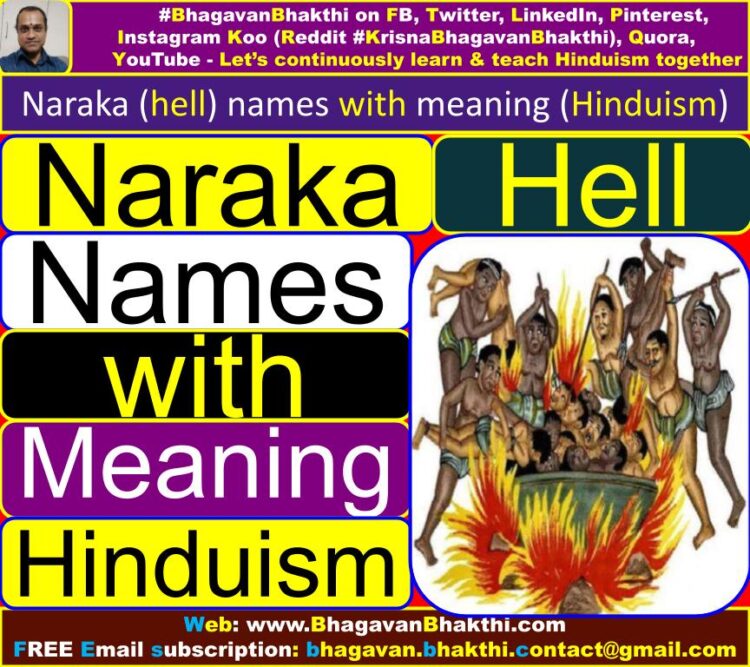
If one worships Lord Sri Vishnu with flowers and especially with Tulasi leaves, or one who always make the smarana (chanting) of Lord Srimann Narayana –
Then that person will never go to Naraka (Hell). There are several such Narakas (Hell).
Although people do not wish to die or if they die also, they would never ever would dream to go to Naraka.
But we should always remember that, people are bound to die once their predestined time span on earth has been exhausted.
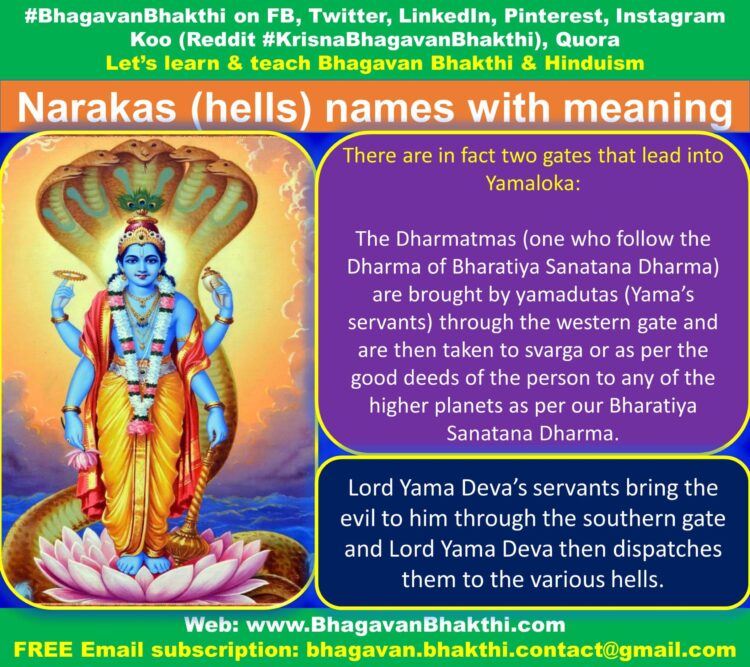
One then has to pay for whatever sins one might have committed.
The sinners suffer and those who have performed good deeds are naturally rewarded.
There are in fact two gates that lead into Yamaloka.
The Dharmatmas (one who follow the Dharma of Bharatiya Sanatana Dharma) are brought by yamadutas (Yama’s servants) through the western gate.
And are then taken to svarga or as per the good deeds of the person to any of the higher planets as per our Bharatiya Sanatana Dharma.
Lord Yama Deva’s servants bring the evil to him through the southern gate and Lord Yama Deva then dispatches them to the various hells.
Narakas are of 2 types, that is –
‘anitya narakas’ ( Not eternal / Temporary / Not permanent) and
‘nitya narakas’ (Eternal / Permanent / Everlasting).
Nitya narakas are Tamisra and Andha Tamisra.
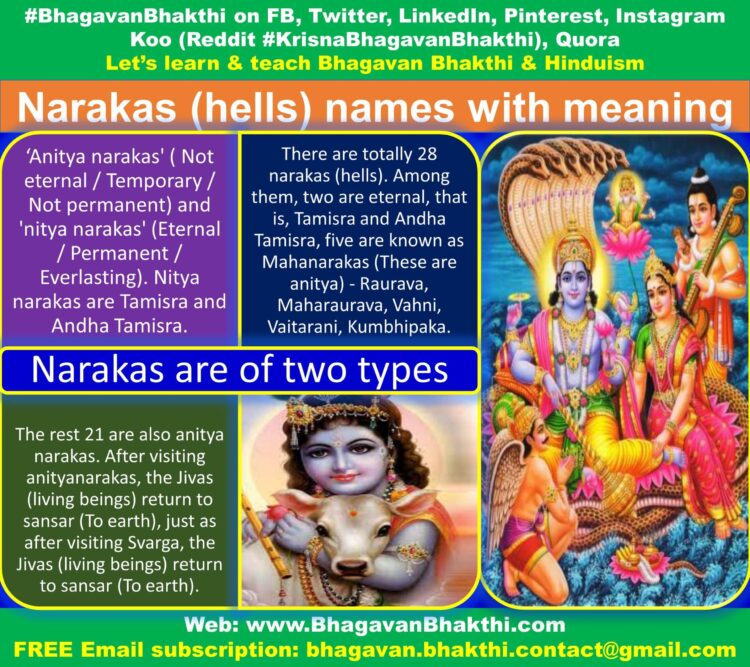
There are totally 28 narakas (hells). Among them, two are eternal, that is, Tamisra and Andha Tamisra.
And five are known as Mahanarakas (These are anitya) – Raurava, Maharaurava, Vahni, Vaitarani, Kumbhipaka.
The rest 21 are also anitya narakas.
After visiting anityanarakas, the Jivas (living beings) return to sansar (To earth), just as after visiting Svarga, the Jivas (living beings) return to sansar (To earth).
Now, first let us know the names of Narakas (hells) and later let us know it’s meaning also.
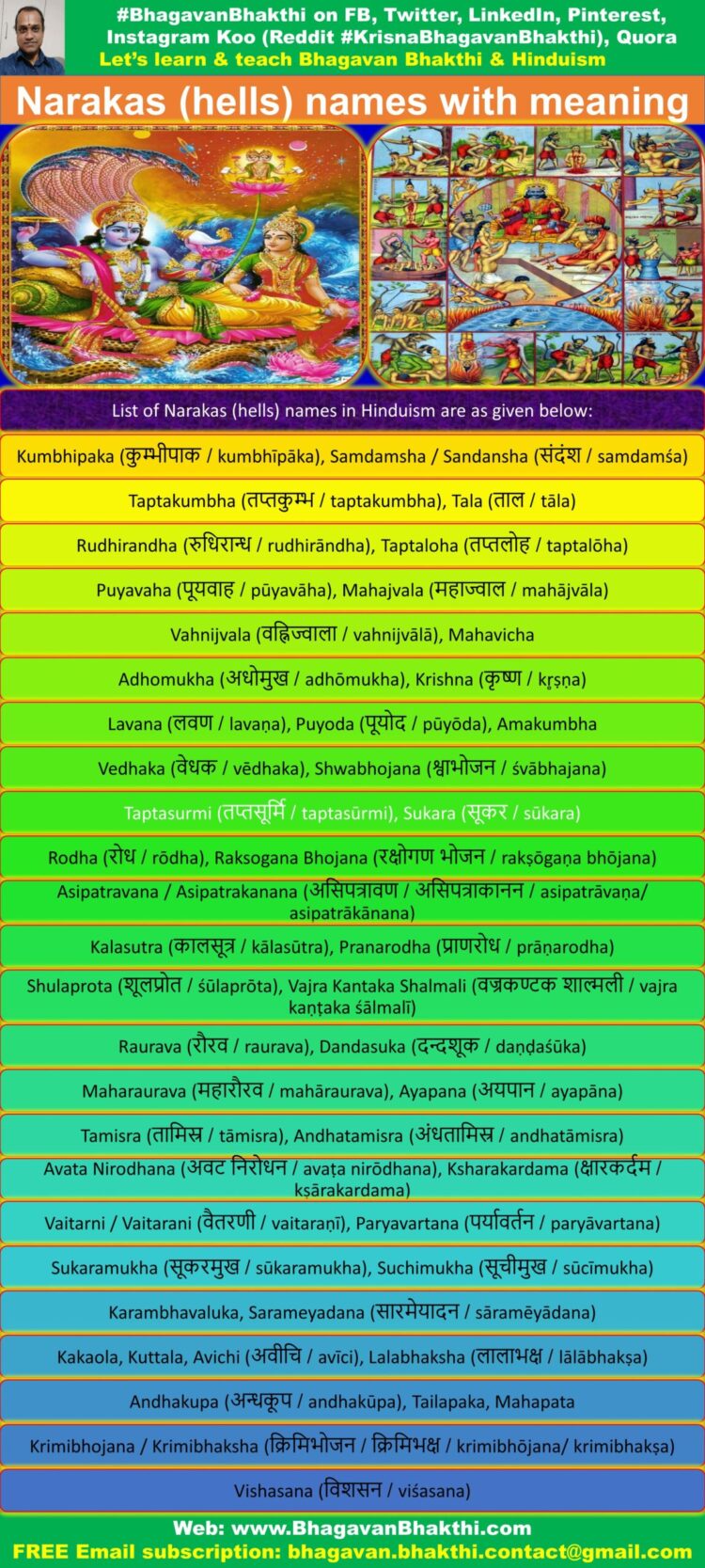
List of Naraka (Hell) names in Hinduism are as given below:
Kumbhipaka (कुम्भीपाक / kumbhīpāka)
Samdamsha / Sandansha (संदंश / samdamśa)
Taptakumbha (तप्तकुम्भ / taptakumbha)
Tala (ताल / tāla)
Rudhirandha (रुधिरान्ध / rudhirāndha)
Taptaloha (तप्तलोह / taptalōha)
Puyavaha (पूयवाह / pūyavāha)
Mahajvala (महाज्वाल / mahājvāla)
Vahnijvala (वह्निज्वाला / vahnijvālā)
Mahavicha
Adhomukha (अधोमुख / adhōmukha)
Krishna (कृष्ण / kr̥ṣṇa)
Lavana (लवण / lavaṇa)
Puyoda (पूयोद / pūyōda)
Amakumbha
Vedhaka (वेधक / vēdhaka)
Shwabhojana (श्वाभोजन / śvābhajana)
Taptasurmi (तप्तसूर्मि / taptasūrmi)
Sukara (सूकर / sūkara)
Rodha (रोध / rōdha)
Raksogana Bhojana (रक्षोगण भोजन / rakṣōgaṇa bhōjana)
Asipatravana / Asipatrakanana (असिपत्रावण / असिपत्राकानन / asipatrāvaṇa/ asipatrākānana)
Kalasutra (कालसूत्र / kālasūtra)
Pranarodha (प्राणरोध / prāṇarodha)
Shulaprota (शूलप्रोत / śūlaprōta)
Vajra Kantaka Shalmali (वज्रकण्टक शाल्मली / vajra kaṇṭaka śālmalī)
Raurava (रौरव / raurava)
Dandasuka (दन्दशूक / daṇḍaśūka)
Maharaurava (महारौरव / mahāraurava)
Ayapana (अयपान / ayapāna)
Tamisra (तामिस्र / tāmisra)
Andhatamisra (अंधतामिस्र / andhatāmisra)
Avata Nirodhana (अवट निरोधन / avaṭa nirōdhana)
Ksharakardama (क्षारकर्दम / kṣārakardama)
Vaitarni / Vaitarani (वैतरणी / vaitaraṇī)
Paryavartana (पर्यावर्तन / paryāvartana)
Sukaramukha (सूकरमुख / sūkaramukha)
Suchimukha (सूचीमुख / sūcīmukha)
Karambhavaluka
Sarameyadana (सारमेयादन / sāramēyādana)
Kakaola
Kuttala
Avichi (अवीचि / avīci)
Lalabhaksha (लालाभक्ष / lālābhakṣa)
Andhakupa (अन्धकूप / andhakūpa)
Tailapaka
Mahapata
Krimibhojana / Krimibhaksha (क्रिमिभोजन / क्रिमिभक्ष / krimibhōjana/ krimibhakṣa)
Vishasana (विशसन / viśasana)
Now, let us know the list of narakas (hells) names with meaning in Hinduism are as given below:
Kumbhipaka (कुम्भीपाक / kumbhīpāka) : Someone who cooks animals and birds alive,
is also cooked alive in boiling oil for as many years as there will be hairs on the bodies of the animal (bird) victims.
In Sanskrit Kumbhipaka means, Kumbhipaka = Kumbhi + Paka = Huge pot + Cooked = Cooked in a huge pot.
Samdamsha / Sandansha (संदंश / samdamśa) : A person who robs a Brahmin or steals jewels from others, when though not in need will have to stay in this naraka.
This is said in Srimad Bhagavatam (Sri Vishnu Purana).
But, Srimad Bhagavan (Sri Vishnu Purana) also tells that, someone who violets his / her vows will have to suffer huge pain in this naraka.
His / her body have to face the red-hot iron balls and tongs. In Sanskrit Samdamsha means a tweezer or tong.
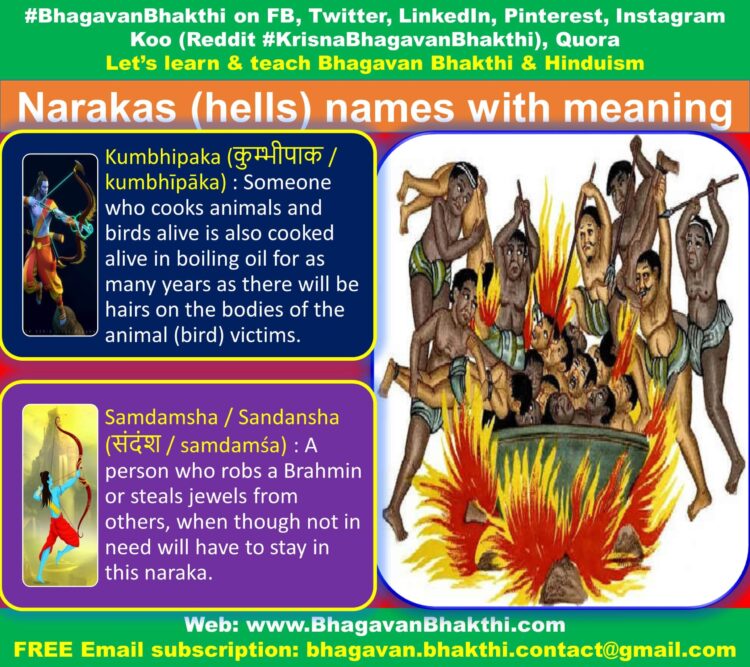
Taptakumbha (तप्तकुम्भ / taptakumbha) :
Someone having illicit relationship with his own sister and someone who would have murdered an ambassador will be sent here.
Such a sinner will be pushed into hot vessel (pot). In Sanskrit, Taptakumbha = Hot (Red hot) + Vessel (Pot).
Tala (ताल / tāla) : Someone who murders a Kshatriya or a Vaishya and have illegitimate relationship with wife of a religious leader leads to this naraka.
In Sanskrit Tala means locked for a very long time.
Rudhirandha (रुधिरान्ध / rudhirāndha) : A sports person like a boxer or a wrestlers who fights for entertainment, followers of scoundrels, arsonists, informants,
poisoners, incorrectly fortune-tellers, those who have coitus on holy days, a person who live on the money earned by his wife’s prostitution work, etc. are pushed into this naraka.
In Sanskrit, Randhirandha = Well of blood.
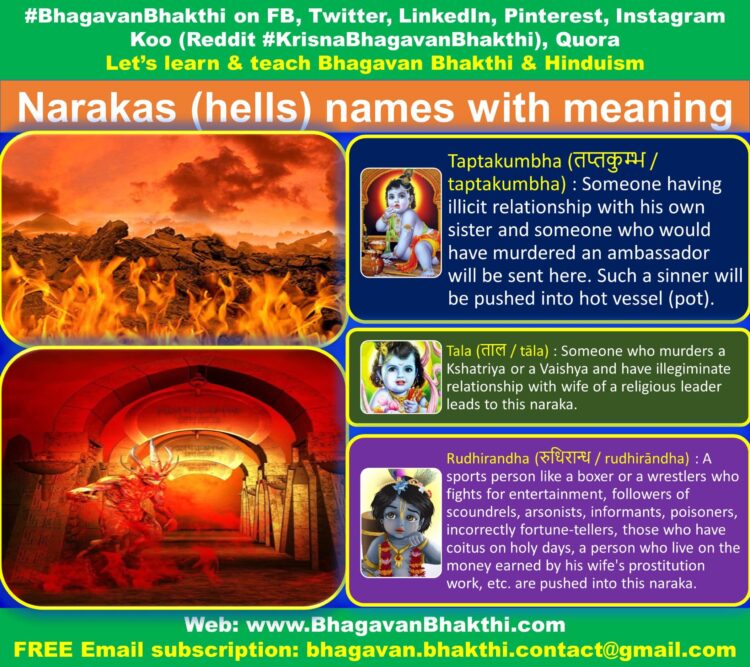
Taptaloha (तप्तलोह / taptalōha) : Someone who sells his own wife, someone who has gone to jail doing small crime,
and someone who has abandon his followers is thrown in this naraka.
In Sanskrit Taptaloha = Hot (Red hot) + Iron.
Puyavaha (पूयवाह / pūyavāha) : Even though been a Brahmin, if he sells meat, lac, salt, alcohol,
if he commits violence and if he eats sweets without sharing with others will be sent to this naraka.
In Sanskrit Puyavaha = A place where matter falls.
Mahajvala (महाज्वाल / mahājvāla) : Someone who will have illicit relationship with his own daughter or daughter-in-law will be pushed into this naraka.
In Sanskrit Mahajwala = Maha + Jwala = Great (Huge) + Fire.
Vahnijvala (वह्निज्वाला / vahnijvālā) : Hunters, Potter, and shepherds, etc. for their crimes are punished in Vahnijvala.
In Sanskrit Vahnijvala means fire flame.
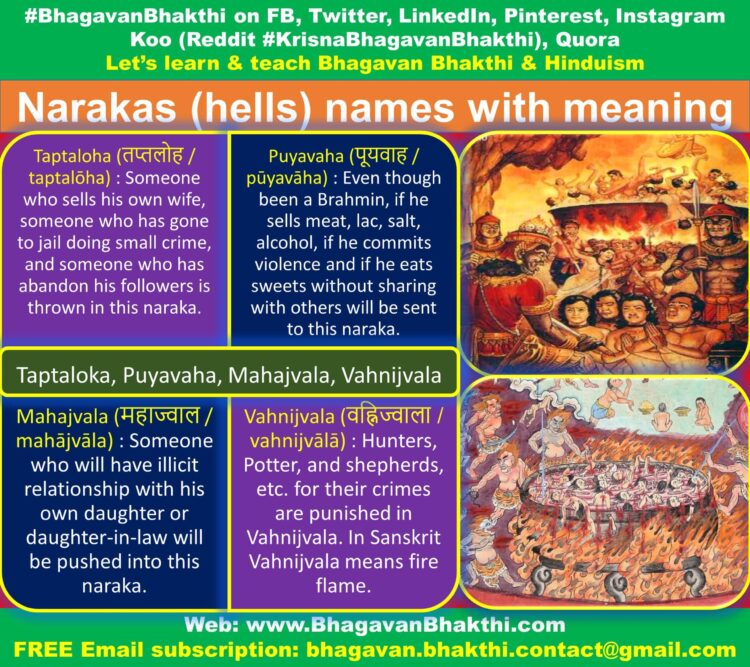
Mahavicha : If one kills a cow, one has to spend one lakh years in a naraka known as Mahavicha.
Adhomukha (अधोमुख / adhōmukha) : Someone who takes bribe, an incorrect astrologer and someone who worships improper objects is thrown into this naraka.
In Sanskrit, Adhomukha = Upside down + faced.
Krishna (कृष्ण / kr̥ṣṇa) : A swindler or a encroacher and one who causes impotence is pushed into this naraka.
In Sanskrit Krishna means a very dark place.
Lavana (लवण / lavaṇa) : Someone who defames his Guru or people who are superior to hima / her or someone who insult the divine Vedas go to this naraka.
In Sanskrit, Lavana = Salt.
Puyoda (पूयोद / pūyōda) : The fourth varna people who are called as Shudras’ husbands or sexual partners of despicable women and prostitutes,
who live like animals and who are devoid of cleanliness, Dharma, etc. will be sent to this Puyoda naraka.
This Puyoda naraka will be full of urine, pus, excreta, mucus, saliva, etc. Here, these people will be forced to eat these unpleasant things.
In Sanskrit Puyoda = A place full of unhealthy things as mentioned here.
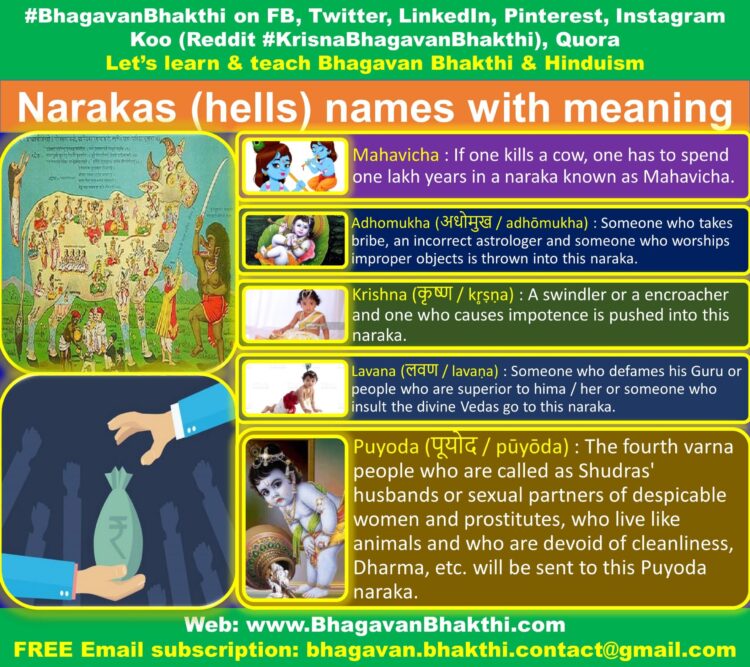
Amakumbha : If one kills a brahmana or steals land, there is a burning naraka named Amakumbha that one goes to.
There one suffers till the day when the universe is destroyed.
Vedhaka (वेधक / vēdhaka) : Someone who makes the arrows for an Adharmi will have to go to this naraka.
The sinner will also be pierced like the arrow pierces. In Sanskrit, Vedhaka = piercing.
Shwabhojana (श्वाभोजन / śvābhajana) : A Dharmic student who sleeps in the day time and one who does not have spiritual knowledge
and also someone who learns it from children is thrown in this naraka and he / she becomes the food of dogs.
In Sanskrit, Shwabhojana = Shwa + Bhojana = Dogs + Food.
Taptasurmi (तप्तसूर्मि / taptasūrmi) : A person (man or woman) who indulges in illegitimate sexual relations with a woman or man will be beaten by whips
and he / she will be forced to embrace red-hot iron doll like statue of the opposite sex.
In Sanskrit, Taptasurmi = Tapta + Surmi = Red hot + Iron statue.
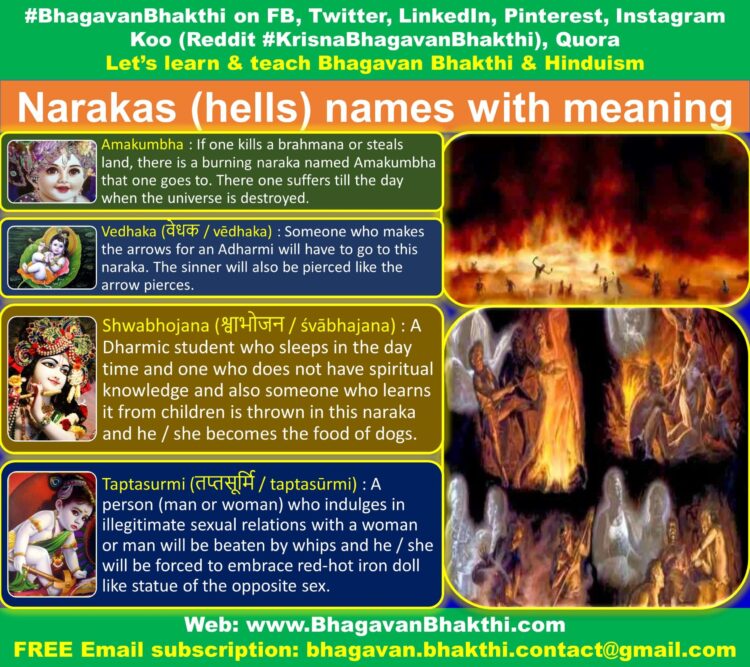
Sukara (सूकर / sūkara) : Someone who murders a Brahmin and / or a stealer of jewels and / or who drinks alcohol
and someone who may directly associated with them fall into this naraka.
In Sanskrit Sukara = A pig.
Rodha (रोध / rōdha) : Someone who aborts a foetus inside the womb or someone who kills cow
or someone who is a plunderer or one who strangles a man pushed in this naraka called Rodha.
In Sanskrit, Rodha = Barrier (Obstruction).
Raksogana Bhojana (रक्षोगण भोजन / rakṣōgaṇa bhōjana) : Someone who is practicing sacrifice of human(s)
and anthropophagous are strictly condemned and are sent to this naraka called Raksogana.
In Sanskrit, Raksogana Bhojana = Rakso + Gana + Bhojana = Rakshasas (Demons) + Group + food.
The victims of such people in the form of Rakshasas, cut them with sharp swords and blades.
The Rakshasas feast on their meat and blood, and they dance, sing in joy.
This will be like a the victims who would had tolerated all the hardships and finally who would had got justice.
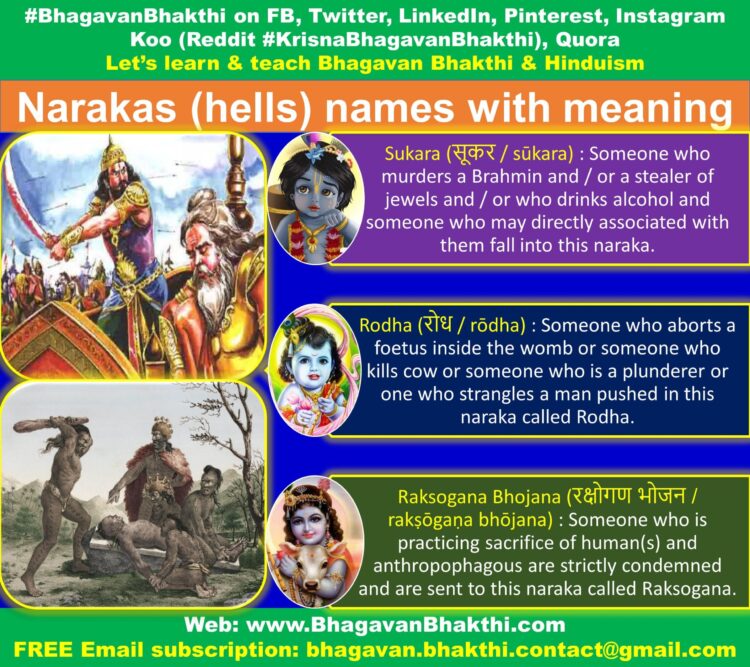
Asipatravana / Asipatrakanana (असिपत्रावण / असिपत्राकानन / asipatrāvaṇa/ asipatrākānana) :
This naraka is reserved for a someone who deviate from the Dharmic teachings of the Vedas and also who indulges in heterodoxy (Adharma).
If you kill your father and / or mother, you will be sent to the hell called Asipatravana.
There you will be continuously sliced into pieces with swords.
The divine Srimad Bhagavatam (Sri Vishnu Purana) says that someone who ‘willfully cut the tree(s)’, such person has to stay in this naraka.
The Sanskrit meaning of Asipatrakanana = Asi + patra + kanana = Blade + Sword (Leaves) + Forest, that is –
a place / forest where leaves of trees will be as sharp as blades.
Lord Yama Deva’s soldiers beat such person with whips as they try to run away in the forest where palm trees leaves will be like swords.
Afflicted with injury of whips and swords, they faint and cry out for help, but everything will be in vain.
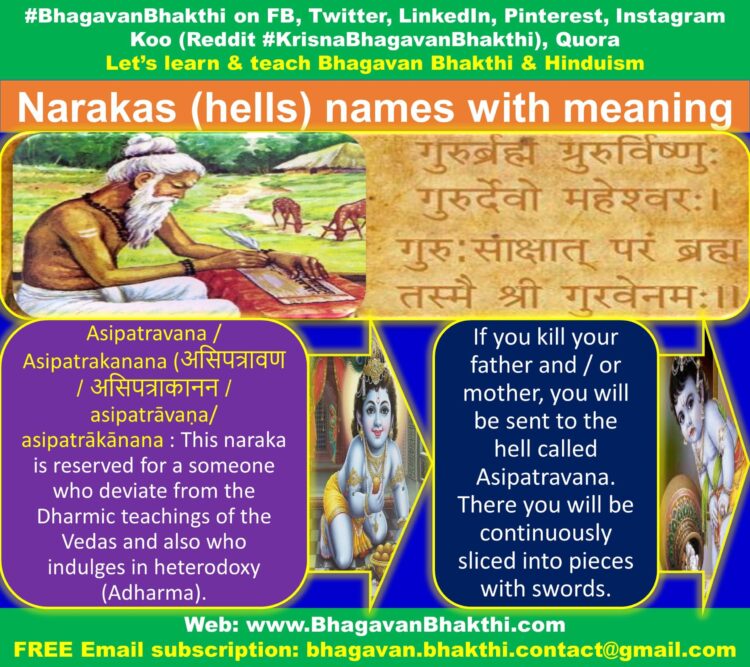
Kalasutra (कालसूत्र / kālasūtra) : The Devi Bhagavata Purana says that a person who disrespects his elders, parents, ancestors, brahmins,
respected people etc. and the Srimad Bhagavatam (Sri Vishnu Purana) tells that this naraka / hell is for a murderer of a brahmin.
This vessel here is made entirely of copper and it will be extremely hot.
This is heated by high flame from below and same amount of heat is produced from the above by Sun.
Here, the sinner is burnt from within by hunger and thirst and the smoldering Sun’s heat from outside.
The sinner whether he / she sleeps, sits, stands or runs doesn’t bother to Lord Yama Deva’s soldiers.
In Sanskrit, Kalasutra means ‘a thread of death or time’.
Pranarodha (प्राणरोध / prāṇarodha) : Few of the Adharmic people of the varnas of Brahmins, Kshatriyas and Vaishyas involved in the unhealth sports like:
hunting with their dogs, donkeys etc. in the forest.
This will result in unwanted killing of animals, birds etc.
With such kind of people, Lord Yama Deva’s soldiers will play archery like sport and those people will be their targets in this naraka.
Those kind of people will run for their life, wherein they won’t be able to breath properly.
In Sanskrit, Pranarodha = Breath + Suppression.
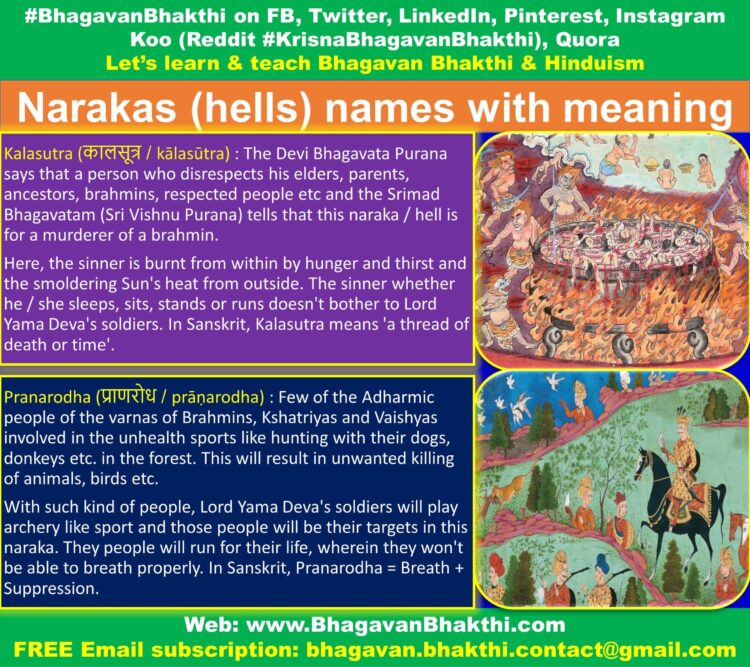
Shulaprota (शूलप्रोत / śūlaprōta) : Someone who pretends to be like a shelter giver to animals or birds and act as if they are their saviors.
But, later they will harm them pricking with needles, threads or sometimes they will use them like lifeless toys.
Also, these people behave the same way with humans too.
That is, firstly they will win the common people confidence and then later they may kill them with sharp weapons like tridents etc.
Such sinners bodies will be fatigued with thirst and hunger.
They will be pierced with sharp needle-like spears called Shulaprota.
Later fiercely man-eating birds like vultures tear and eat their meat.
In Sanskrit Shulaprota = Shula + Prota = Spear + pierced.
Vajra Kantaka Shalmali (वज्रकण्टक शाल्मली / vajra kaṇṭaka śālmalī) :
Someone (man or woman) who will be involved in sexual intercourse with other than humans
and if he / she has excessive copulation is tied to a hard-thorned silk-cotton-tree
and pulled by Lord Yama Deva’s soldiers so that the thorns tear his / her body.
In Sanskrit, Vajra Kantaka Shalmali = Vajra + Kantaka + Shalmali = Hard + Thorn + Silk-Cotton tree.
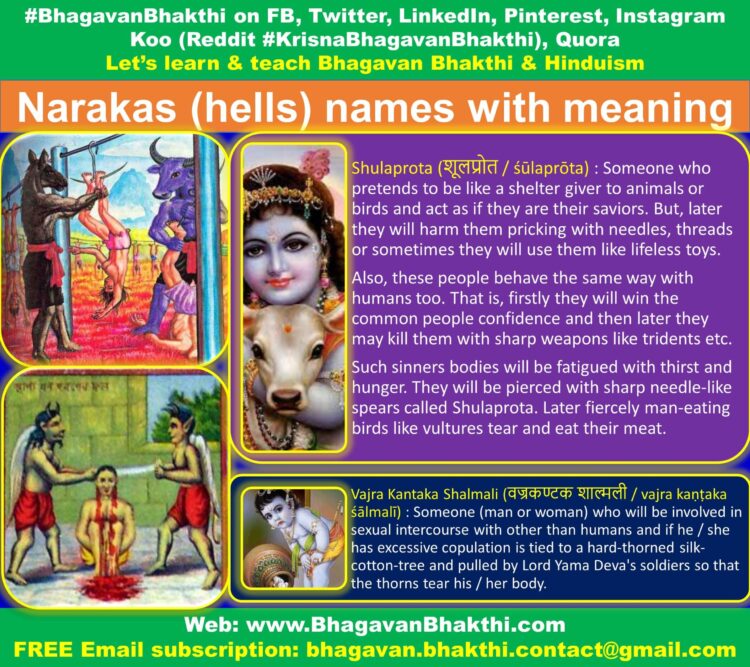
Raurava (रौरव / raurava) : A killer of women, children or old men stays in Raurava naraka for the span of fourteen manvantaras.
In Sanskrit Raurava means ‘a place of fearful Ruru monsters’.
Dandasuka (दन्दशूक / daṇḍaśūka) : Few people harm others like snakes because of enmity, envy with furious and malignant methods.
In this naraka called Dandasuka, such kind of people are destined to be devoured by five or seven hooded serpents.
In Sanskrit Dandasuka = Furious and mordacious snakes.
Maharaurava (महारौरव / mahāraurava) : An arsonist is sent to Maharaurava and burnt there for an entire kalpa.
In Sanskrit Maharaurava means, ‘a greatly fearful place of Ruru monsters’.
Ayapana (अयपान / ayapāna) : Someone may belong to any varna and who gives a oath to someone,
but doesn’t fulfill that oath or a Brahmin who drinks alcohol is punished in this naraka.
Lord Yama Deva’s soldiers stand on such kind of people’s chests and force them to drink molten iron.
In Sanskrit Ayapana = Aya + Pana = Iron molt + Drink.
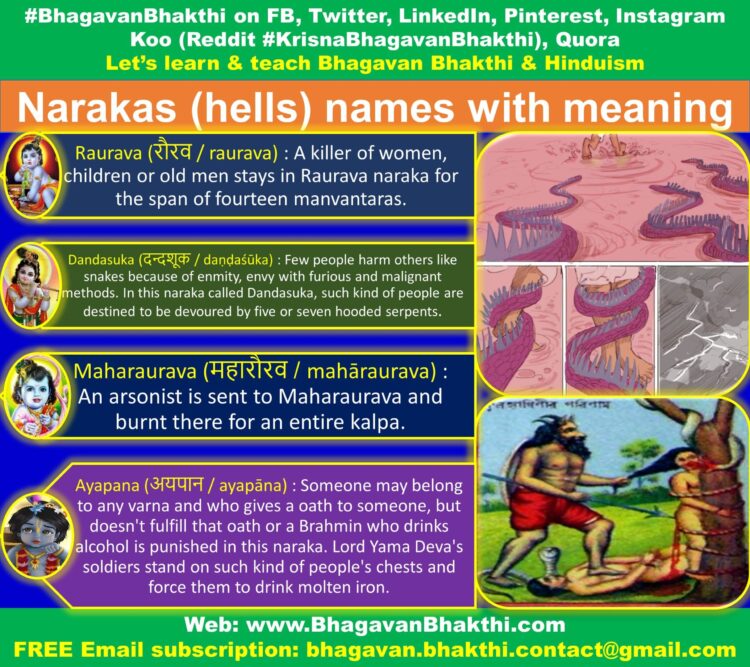
Tamisra (तामिस्र / tāmisra) : Here Tamisra in Sanskrit means ‘very dark place’.
A thief goes to Tamisra, where he is continuously pierced with spears by Yama’ servants for several kalpas.
After that, a thief is taken to Mahatamisra to be bitten by snakes and insects.
Andhatamisra (अंधतामिस्र / andhatāmisra) : Here Andhatamisra in Sanskrit means ‘very very blindedly dark place’.
Any man / woman who deceives another man / woman and enjoys his / her wife / husband or children is tortured to such an extent,
that he / she will lose his / her brainpower and sight permanently.
The torture is described as cutting a tree at its roots.
Avata Nirodhana (अवट निरोधन / avaṭa nirōdhana) :
Someone who always trouble others and imprison them in dark wells or mountain caves are shoved into this naraka called Avata Nirodhana.
This naraka is such a dark well engulfed place and also will have highly toxic fumes and smoke that suffocates them.
In Sanskrit Avata Nirodhana = Avata + Nirodhana = Hole + Confining.
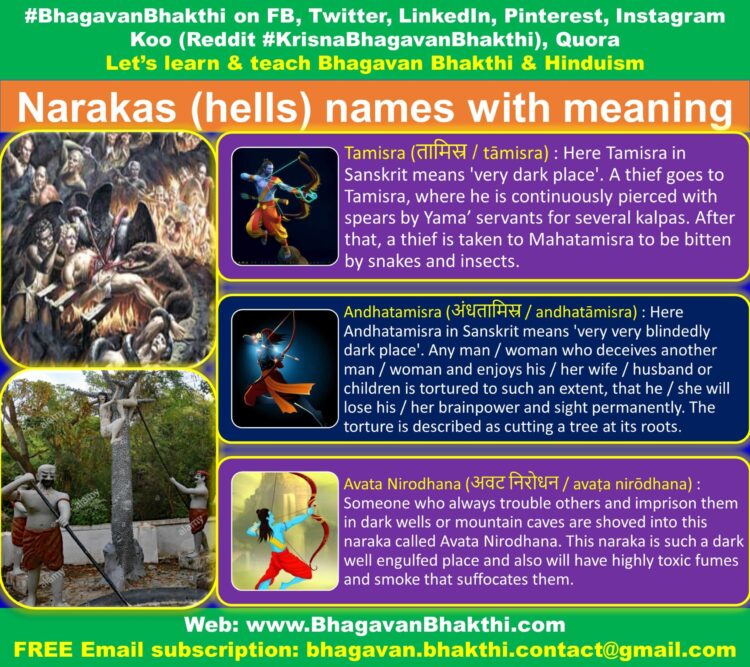
Ksharakardama (क्षारकर्दम / kṣārakardama) : Someone who has false pride,
someone who doesn’t honor a person of higher status than him who has higher knowledge, austerity, behavior, spiritual order etc. is tormented in this hell called Ksharakardama.
Lord Yama Deva’s soldiers push him / her head-first and torture him.
In Sanskrit, Ksharakardama = Kshara + Kardama = Alkali + Mud (Filth).
Vaitarni / Vaitarani (वैतरणी / vaitaraṇī) : It is a river which lies between Naraka and the earth.
This Vaitarni river is filled with huge excreta, blood, urine, hair, pus, nails, bones, marrow, flesh, etc.
This river forms the boundary of naraka.
Here ferocious aquatic-beings eat the person’s flesh who would have done the heinous Karmas.
In Sanskrit Vaitarani = A river that flows between earth and hell.
As said in Srimad Bhagavatam (Sri Vishnu Purana), someone born in a dignified families like a Kshatriya family, or Government official,
but if he neglects his duty is thrown into this river of naraka.
Paryavartana (पर्यावर्तन / paryāvartana) : A family-man (woman) who welcomes his / her guests with vicious stares
and also abuses them will have to stay in this naraka called Paryavartana.
Such kind of cruel minded person will be gazed by crows, vultures, herons, etc. and suddenly fly and pluck his / her eyes.
In Sanskrit, Paryavartana = Returning back (This means, such cruel person will be gazed back / returned back his Karma in this naraka).
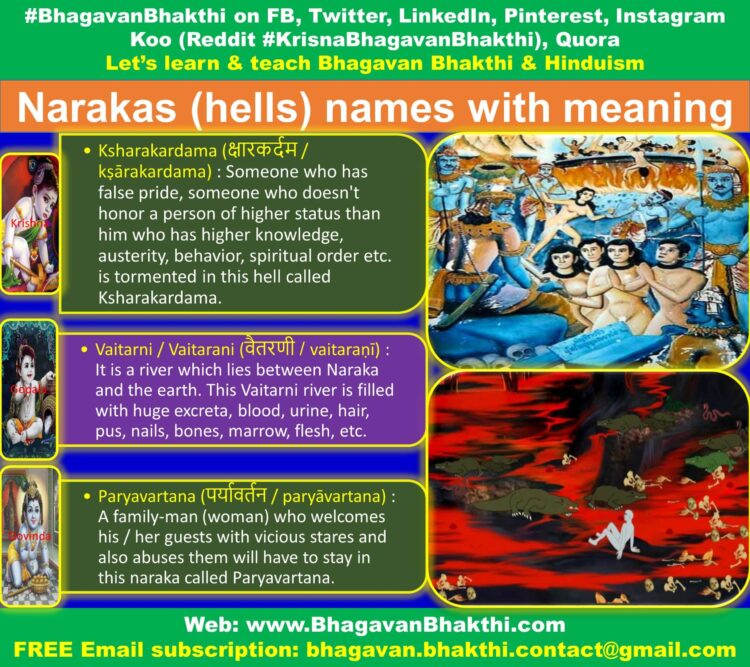
Sukaramukha (सूकरमुख / sūkaramukha) : This naraka is mainly designed for such type of Government officials or Politicians (Kings),
who punish the innocent or grant physical punishment, especially to a Brahmin.
Lord Yama Deva’s soldiers in this naraka crush such type of person as sugar cane is crushed to extract juice.
He / She will cry loudly and shout in high agony, just as the guiltless suffered. But everything will be in vain.
The Sanskrit meaning of Sukaramukha = Sukara + Mukha = Pig + Mouth.
Suchimukha (सूचीमुख / sūcīmukha) : A person who always has the suspicious mind will always be wary of people trying to grab his wealth.
Such a proud person will make multiple sins to gain and to retain the wealth.
Lord Yama Deva’s soldiers stitch thread through his whole body in this naraka called Sucimukha.
In Sanskrit Suchimukha = Suchi + Mukha = Pointed (Needle) + Faced.
Karambhavaluka : If you burn someone to death, you will go to Karambhavaluka where you will be placed on burning sands.
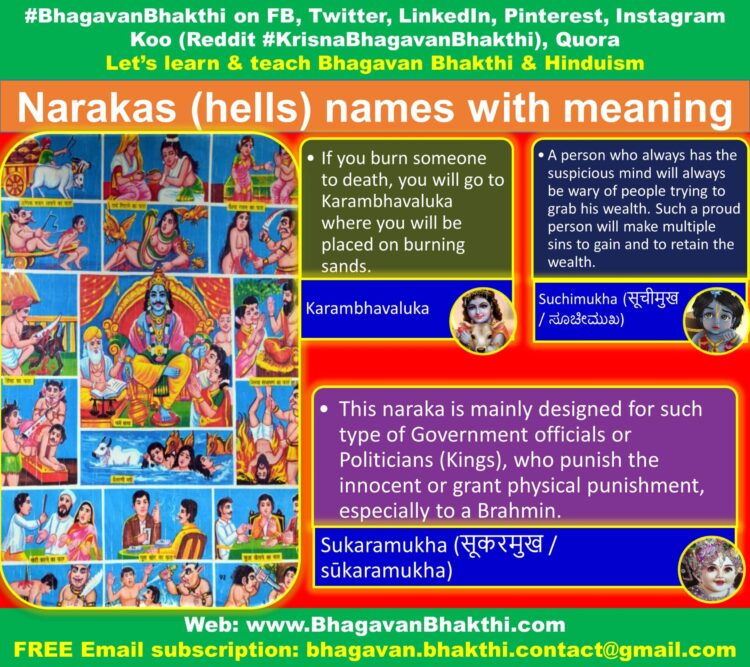
Sarameyadana (सारमेयादन / sāramēyādana) : As per Srimad Bhagavatam (Sri Vishnu Purana), bandits who burn houses and poison people for money or the kings
and other government officials who forcefully take money from merchants or mass murder or someone who ruin the whole nation, are thrown into Sarameyadana naraka.
Exactly seven hundred and twenty ferocious dogs (In Sanskrit these dogs are called as Saramas – The sons of Sarama)
who will be having razor-sharp teeth will attack these people as per the instructions given by Lord Yama Deva’s soldiers.
In Sanskrit, Sarameyadana = Group of highly ferocious dogs (sons) of Sarama.
Kakaola : A person who eats sweets alone without sharing with others will go to Kakaola Naraka and is fed only worms.
Kuttala : A person who does not perform yajnas (in Kaliyuga if one doesn’t do Pooja and / or Sri Hari naama smarana) goes to Kuttala and is fed blood.
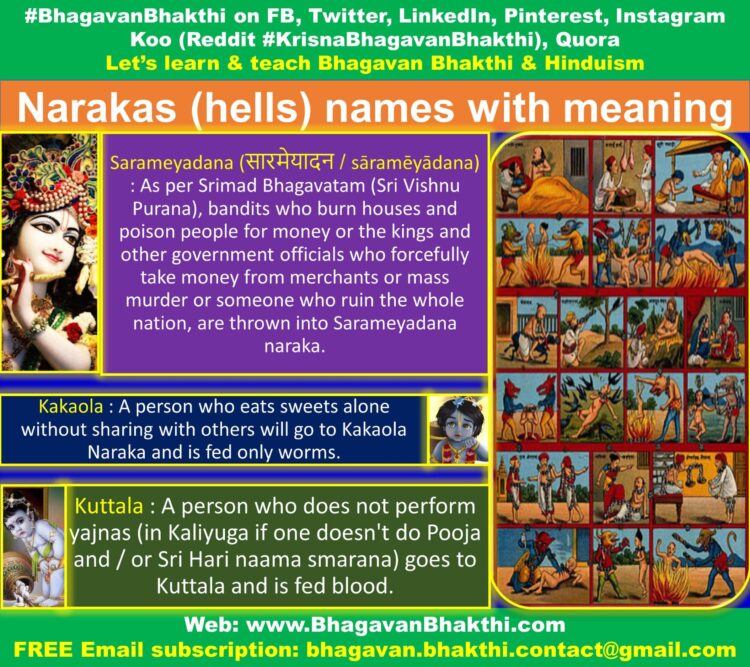
Avichi (अवीचि / avīci) : As per Srimad Bhagavatam (Sri Vishnu Purana),
if a person lies on his own oath or in business, is continuously thrown head-first from a 100 yojana high mountain.
This mountain’s sides will be full of stone waves, but without a drop of water.
Such a person’s body is repeatedly broken, but Lord Yama Deva’s soldiers will make sure that he / she does not die.
In Sanskrit Avichi = A + Vichi = Without wave (Waveless).
Lalabhaksha (लालाभक्ष / lālābhakṣa) : As said in Srimad Bhagavatam (Sri Vishnu Purana) a Brahmin or a Kshatriya or a Vaishya husband,
who pressurizes his wife to drink his semen out of libido and to enforce his control,
will be thrown in a river full of semen and he will be forced to drink the same.
In Sanskrit Lalabhaksha = Lala + Bhaksha = Saliva (Semen) + Eating.
Andhakupa (अन्धकूप / andhakūpa) : It is a special type of naraka. Here if someone who harms others with the main purpose of maligning.
Sanskrit meaning of this word is, Andhakupa = Mouth is closed (hidden) + Well.
The mouth of the well is closed (hidden).
Such a person will be attacked by different types of birds, animals, flies, worms, reptiles, mammals, mosquitoes, lice etc.
All these will make sure to deprive such person of rest and compel him to run in every corner.
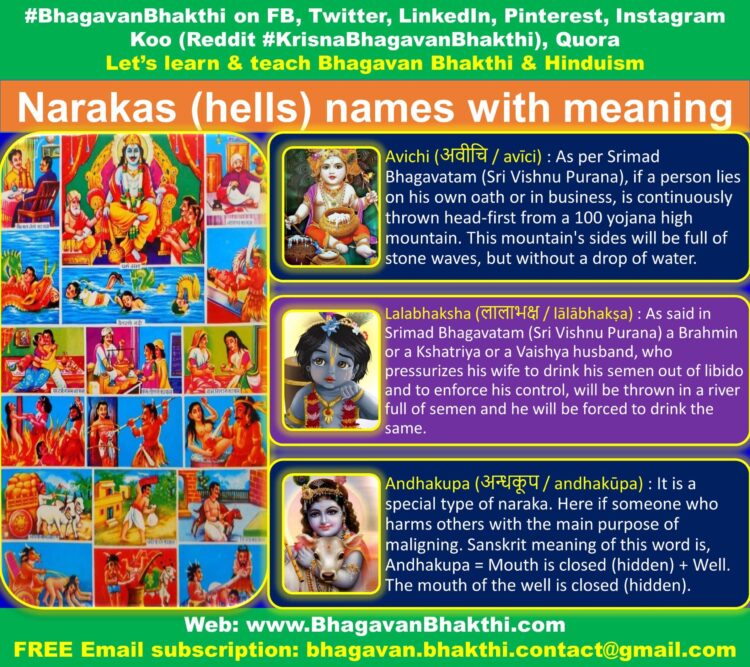
Tailapaka : An oppressor is sent to Tailapaka and is crushed like an oil seed there.
Mahapata : A liar is sent to the naraka named Mahapata.
There are several other narakas too, those who kill animals without any reason, those who cut trees, those who eat too much meat,
those who criticize the Vedas, those who bear false witness and those who criticize their teachers etc.
Krimibhojana / Krimibhaksha (क्रिमिभोजन / क्रिमिभक्ष / krimibhōjana/ krimibhakṣa) :
Srimad Bhagavatam (Sri Vishnu Purana) says that, a person who eats without performing the five yajnas (panchayajna)
and also a person who does not share his / her food with others like children,
guests, elders, doesn’t keep the food for naivedya, he / she who eats alone etc. will be kept in this naraka.
Also, Srimad Bhagavad (Sri Vishnu Purana) says that, if someone who hates his own father or Vedic Brahmins
or the Gods and also someone who destroys the jewels is punished in this naraka.
In Sanskrit Krimibhojana = Krimi + Bhojana = Worms + Feeded. He / she will be feeded with worms.
This naraka is 100,000 yojana huge lake and this is filled with full of worms.
Such a person will be reduced to a worm keeping in this naraka and will be fed with worms.
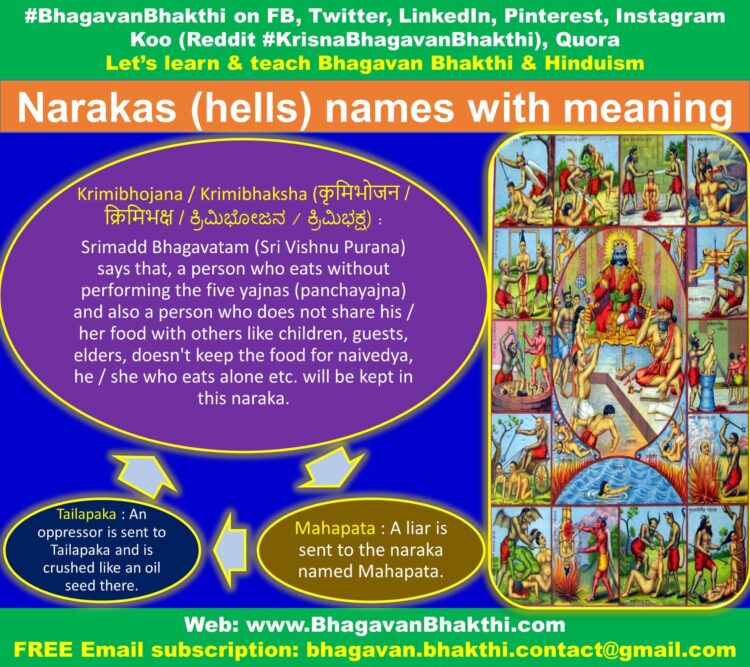
Vishasana (विशसन / viśasana) : Srimad Bhagavatam (Sri Vishnu Purana) says that, Lord Yama Deva’s soldiers lash such kind of person,
who has too high unwanted pride and unwanted wealth and someone who sacrifices animals as a status symbol.
Also, Srimad Bhagavatam (Sri Vishnu Purana) connects it with the maker of swords, spears, and other weapons which is used Adharmically.
In Sanskrit, Vishasana = Using a deadly weapon slaughtering animals for pride.
So stay alert, only Bhakthi towards Bhagavan Sri Vishnu can avoid all these Narakas.
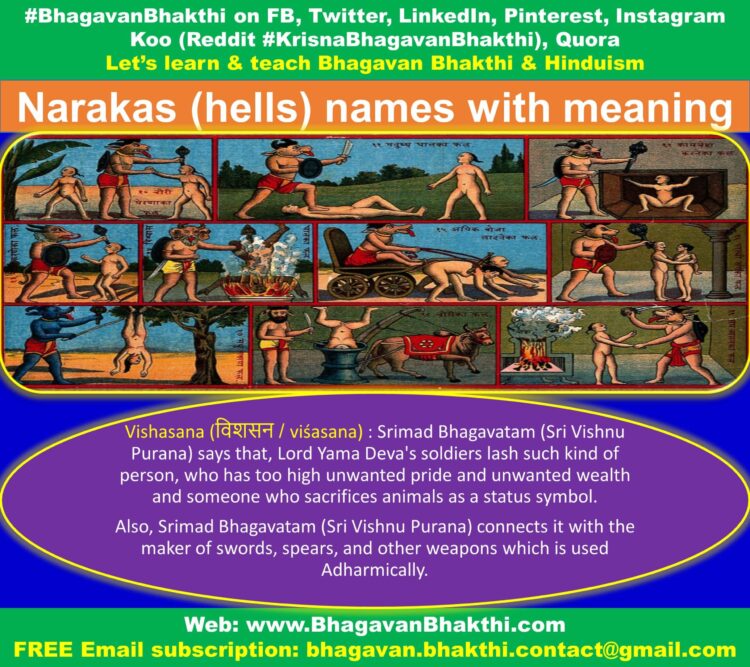
Only chanting OM NAMO NARAYANAYA (or any Bhagavan Sri Vishnu names) and following the right Sanatana Dharma are the only cures.
More important points about Naraka (Hell):
There are five types of avidyas (Without proper knowledge):
Tama,
Moha,
Mahmoha,
Tamisra,
Andhatamisra.
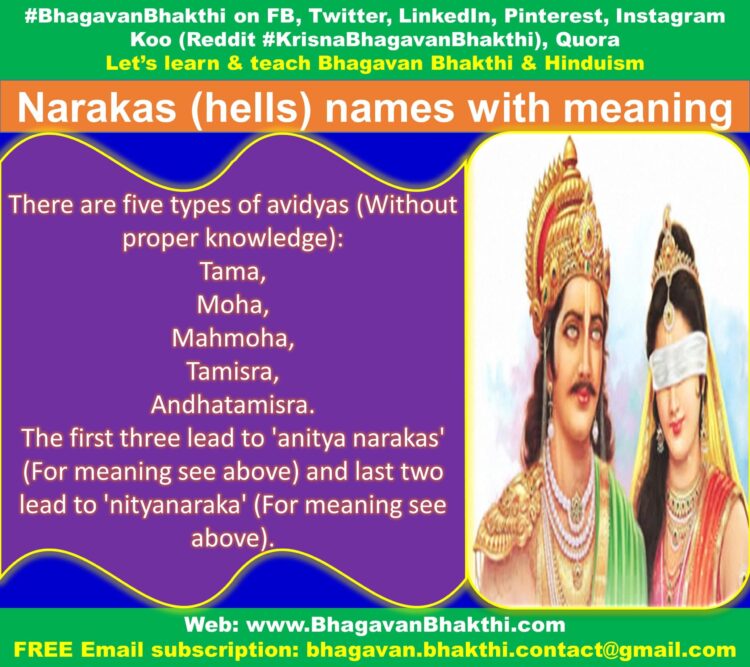
The first three lead to ‘anitya narakas’ (For meaning see above) and last two lead to ‘nityanaraka’ (For meaning see above).
The nitya naraka (Andham tamas) is further divided into upper, middle and lower ones.
There is no sukha (Bliss / Happiness) at all here.
In Brahmasutras, that is, in 3rd adhyaya, 1st paada describes initially the ‘anitya narakas’ and then ‘nitya narakas’.
The Srimad Bhagavatam, 5th skandha gives the list of these 28 narakas and describes them in the 24th adhyaya with full details.
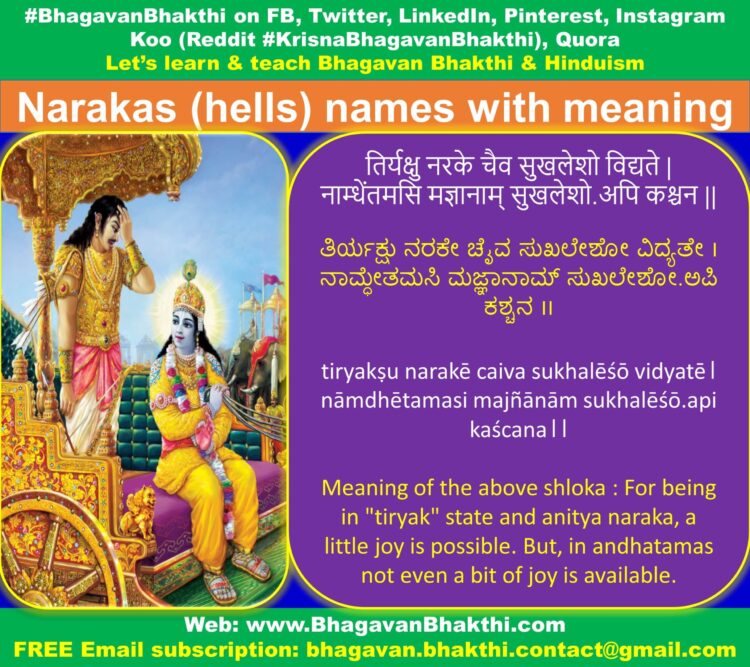
Adhogati is of three kinds:
Tiryak (Being born as lower form of animals),
YatanA (getting torture either in this world or in anitya narakas, and
Tamas (eternal narakas).
Among these third one is further divided into Urdhva, Madhya and Adhara.
तिर्यक्षु नरके चैव सुखलेशो विद्यते | नाम्धेंतमसि मज्ञानाम् सुखलेशो.अपि कश्चन ||
ತಿರ್ಯಕ್ಷು ನರಕೇ ಚೈವ ಸುಖಲೇಶೋ ವಿದ್ಯತೇ । ನಾಮ್ಧೇತಮಸಿ ಮಜ್ಞಾನಾಮ್ ಸುಖಲೇಶೋ.ಅಪಿ ಕಶ್ಚನ ।।
tiryakṣu narakē caiva sukhalēśō vidyatē। nāmdhētamasi majñānām sukhalēśō.api kaścana।।
Meaning of the above shloka : For being in “tiryak” state and anitya naraka, a little joy is possible. But, in andhatamas not even a bit of joy is available.
More information will be added to this on regular, please visit after some time to know more information.
To watch videos on #Hinduism #Sanskrit language, SUBSCRIBE to my YouTube channel from this below link:
#BhagavanBhakthi YouTube channel
Dear friends, if you need any clarifications about this post, kindly let me know, I will definitely try to answer all of them.
Also your one LIKE, one COMMENT, One Share, one SUBSCRIPTION is highly important.
This will help to know the quality of this content and also it will be helpful to know if any improvements is required for the content.
If you feel this content is useful to you and has helped you to improve your knowledge, kindly share this with your well-wishers.
Because “SHARING MEANS CARING”.
For receive FREE EMAIL SUBSCRIPTION about #BhagavanBhakthi, you can send an email to bhagavan.bhakthi.contact@gmail.com from your email ID.
NAMASTE!
Sri Gurubhyyo Namaha
Sri Krishnaayana Namaha
Sri Krishnaarpanamastu
Subscribe / Follow us Share in Social Media